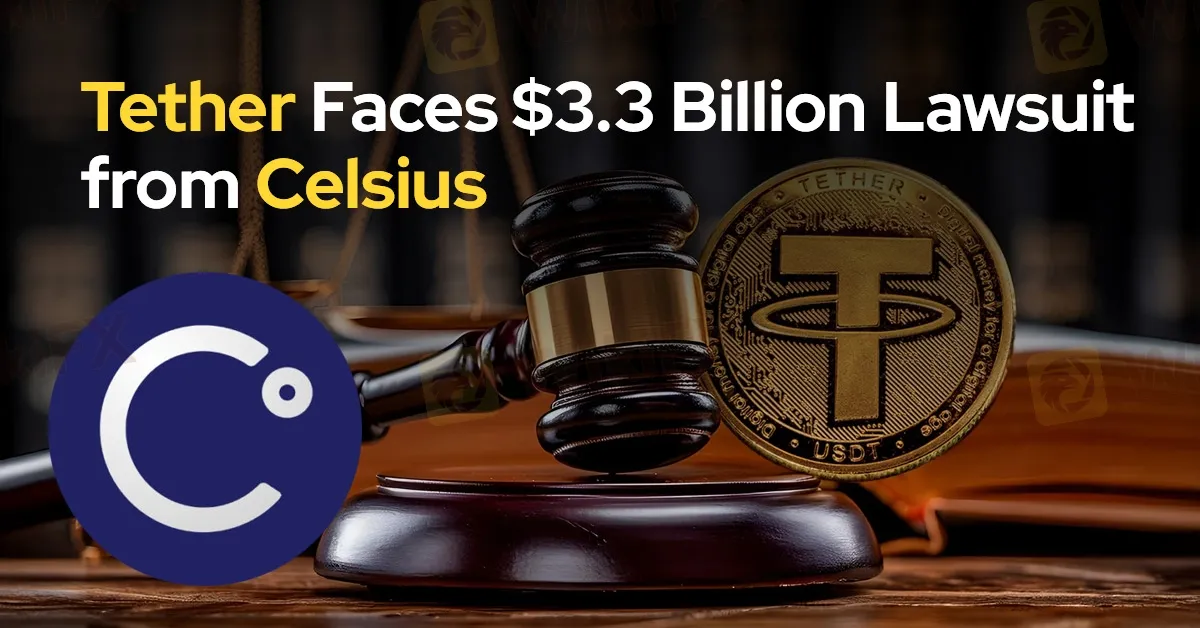Tether Faces $3.3 Billion Lawsuit from Celsius
Abstract:Tether is vigorously contesting a $3.3 billion lawsuit from the bankrupt lender Celsius, which accuses it of fraudulent Bitcoin transfers, while Tether maintains the claims are baseless and asserts its financial stability remains intact.

Tether, the company behind the leading stablecoin USDT, is gearing up to challenge what it labels as a “shake-down” lawsuit from the defunct cryptocurrency lender Celsius.
The lawsuit, lodged with the U.S. Bankruptcy Court for the Southern District of New York, demands that Tether either return 57,428.64 Bitcoin (BTC) or pay its equivalent, which is around $3.3 billion based on current valuations. Celsius alleges that Tether engaged in “preferential and fraudulent transfers” of Bitcoin during the market downturn in mid-2022, just prior to Celsius bankruptcy filing. According to the lawsuit, Tether demanded and received additional collateral from Celsius to secure its position, a move Celsius argues was intended to protect Tether from the looming bankruptcy.
Tether counters these claims, asserting that the Bitcoin was sold at Celsius‘ instruction and with its consent at June 2022 prices. Tether’s CEO, Paolo Ardoino, took to X to label the lawsuit as meritless and affirmed that Tethers actions were fully compliant with their agreement. He vowed to defend against the lawsuit “vigorously” to set a precedent against what he deems “unprincipled money grabs.”

In addition, Celsius is seeking $100 million in damages, accusing Tether of applying Celsius‘ Bitcoin collateral at an undervalued rate, which they claim should be recovered for the benefit of Celsius’ estate. Tether, however, maintains that it remains in a strong financial position, with consolidated equity of nearly $12 billion as of June 30. The company reassures that Tether token holders will not be affected by the ongoing lawsuit.
Previously, Tether dismissed rumours that it had received a $2 billion loan from Celsius. Paolo Ardoino responded to a report by the Celsius examiner that alleged USDT had borrowed from Celsius, along with Three Arrows Capital and Alameda Research. The examiner‘s report, authored by former prosecutor Shoba Pillay, highlighted that Celsius had credit limits for its borrowers, but entities like Alameda, Tether, and 3AC exceeded these limits. It noted that Celsius’ exposure to Tether had surpassed $2 billion and was considered an “existential threat” internally at Celsius. Ardoino suggested that the report might have contained a typographical error or misinterpretation, possibly meaning “Celsius loans from Tether” rather than “Celsius loans to Tether.”
Tether clarified that the loan from Celsius has been fully repaid without any loss. The company emphasized that its lending to Celsius was always overcollateralized, as is standard practice, and had no impact on Tethers reserves. The decision to liquidate the collateral to cover the loan was in line with the original terms agreed upon, which Tether confirmed in writing with Celsius before the liquidation process began. While Tether did have a small investment in Celsius, the company stated that this investment is a minor part of its shareholder equity and has no effect on USDT reserves.

Read more

JPMorgan Expands Rapid Forex Settlements with JPM Coin Blockchain
JPMorgan to offer instant USD/EUR settlements via JPM Coin, with plans to include GBP. Blockchain tech aims to streamline forex for fintech firms.

Polish Financial Regulator Issues Warning on Crypto.com
The Polish Financial Supervision Authority (KNF) has recently issued a cautionary warning regarding Foris DAX MT, the Malta-based entity operating under the Crypto.com brand

FCA Convicts 2 Individuals from CCX Capital & Astaria Group in £1.5M Crypto Scam
The Financial Conduct Authority (FCA) recently secured convictions against Raymondip Bedi and Patrick Mavanga, from CCX Capital and Astaria Group respectively, for orchestrating a £1.5 million investment fraud that affected over 65 investors between February 2017 and June 2019.

SEC Seeks to Dismiss Kraken's Defenses in Legal Case
The SEC intensifies legal action against Kraken, arguing the exchange operates as an unregistered securities platform. Kraken fights back with multiple defenses.
WikiFX Broker
Latest News
Caroline Ellison Begins Two-Year Sentence for FTX Scandal
FCA Convicts 2 Individuals from CCX Capital & Astaria Group in £1.5M Crypto Scam
Beginner 101: WikiFX’s Guide on How to Choose the Right Broker
Why Do Experienced Traders Care About Forex Spreads?
Saxo Singapore Discontinues SaxoWealthCare and SaxoSelect
Trading is Not Gambling—Unless You Make It So
Polish Financial Regulator Issues Warning on Crypto.com
Octa partnered with "Keeping it Real" Foundation to help Nigerian women
TradingView Expands to Include Irish Stocks from Euronext Dublin
Naga Group Appoints Mike Tyson as its Brand Ambassador
Rate Calc

